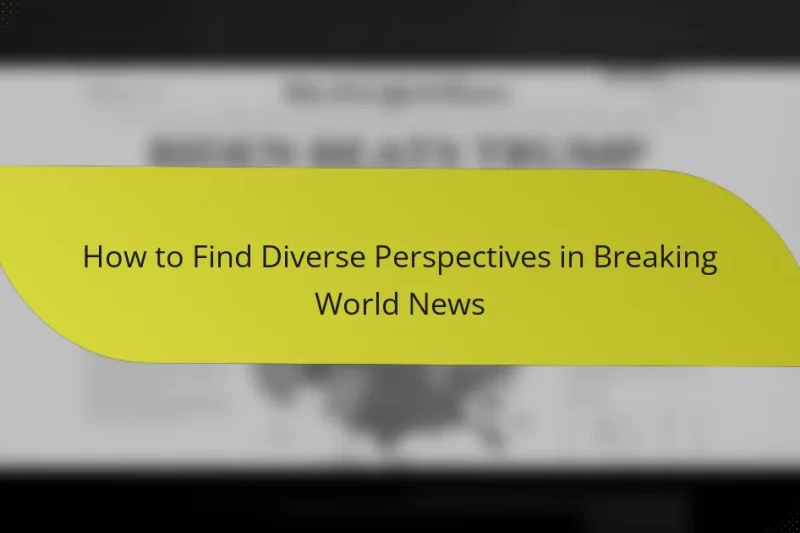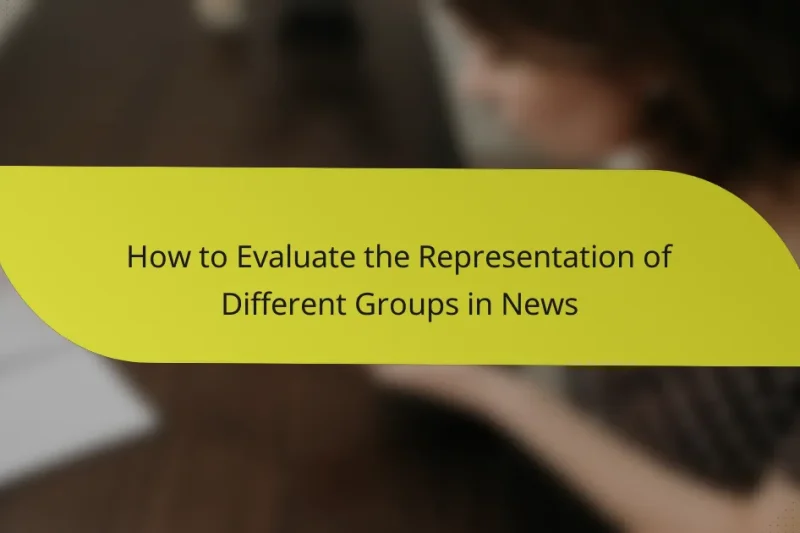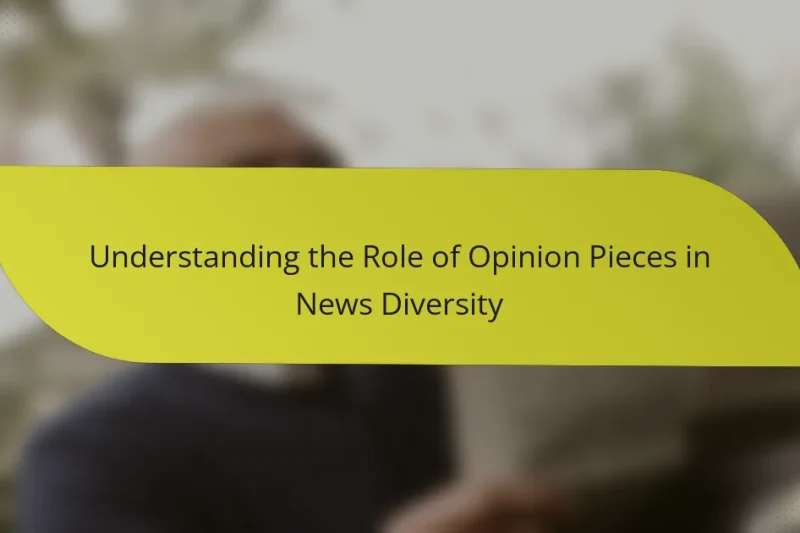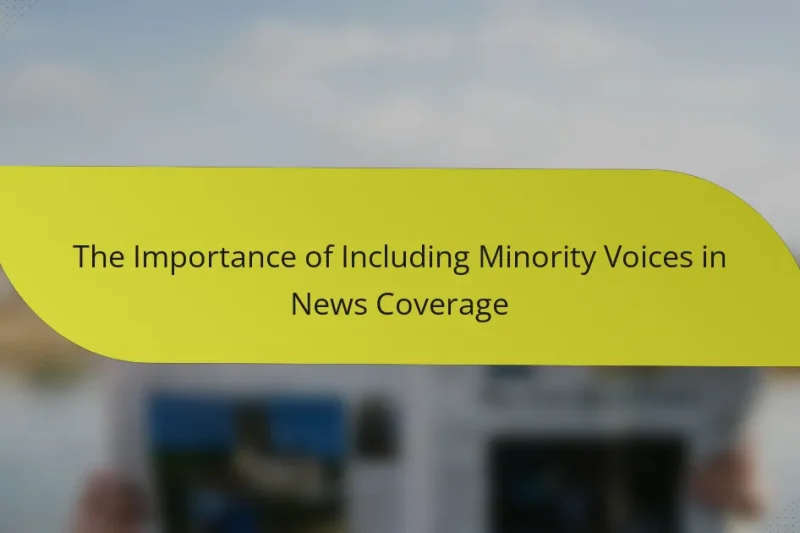Finding diverse perspectives in breaking world news is essential for a well-rounded understanding of global events. … How to Find Diverse Perspectives in Breaking World NewsRead more
Breaking World News Updates: Diverse Perspectives
Stay updated with the latest breaking world news that highlights significant events and developments across politics, economics, and humanitarian issues. Understanding these updates is essential for grasping the complexities of global dynamics and their potential impacts, as different regions interpret news through their unique cultural and social lenses.
How to Evaluate the Representation of Different Groups in News
Evaluating the representation of different groups in news is essential for fostering inclusivity and ensuring diverse … How to Evaluate the Representation of Different Groups in NewsRead more
The Impact of Diverse Reporting on Public Understanding of Events
Diverse reporting plays a crucial role in enhancing public understanding of events by offering multiple perspectives … The Impact of Diverse Reporting on Public Understanding of EventsRead more
How to Access Alternative News Sources for Broader Perspectives
Accessing alternative news sources is essential for gaining a broader understanding of current events and discovering … How to Access Alternative News Sources for Broader PerspectivesRead more
Comparing Coverage of Global Events Across Different Cultures
Global events are interpreted through the lens of diverse cultural contexts, which shape the narratives presented … Comparing Coverage of Global Events Across Different CulturesRead more
Understanding the Role of Opinion Pieces in News Diversity
Opinion pieces are essential for promoting news diversity, as they introduce a range of perspectives and … Understanding the Role of Opinion Pieces in News DiversityRead more
The Importance of Including Minority Voices in News Coverage
Incorporating minority voices in news coverage is essential for fostering a more inclusive media landscape. By … The Importance of Including Minority Voices in News CoverageRead more
What are the latest breaking world news updates?
The latest breaking world news updates cover significant events and developments across various sectors, including politics, economics, and humanitarian issues. Staying informed on these topics is crucial for understanding global dynamics and their potential impacts.
Global political developments
Recent global political developments include shifts in leadership, international treaties, and ongoing conflicts. For instance, several countries are experiencing elections that could reshape their political landscapes, while diplomatic negotiations are underway to address longstanding disputes.
It’s essential to monitor these changes, as they can influence international relations and economic policies. Engaging with reliable news sources can provide insights into how these political shifts may affect your region or interests.
Major economic shifts
Major economic shifts are currently occurring worldwide, driven by factors such as inflation, trade agreements, and technological advancements. Countries are grappling with rising costs of living, prompting governments to implement policies aimed at stabilizing their economies.
For example, some nations are adjusting interest rates to combat inflation, while others are investing in green technologies to stimulate growth. Understanding these economic trends can help individuals and businesses make informed financial decisions.
Natural disasters and humanitarian crises
Natural disasters and humanitarian crises continue to impact various regions, with recent events including earthquakes, floods, and refugee situations. These crises often require immediate international assistance and can lead to long-term challenges for affected communities.
Staying updated on these issues is vital for understanding the global response and potential ways to contribute. Organizations often provide avenues for support, such as donations or volunteering, to aid those in need during these difficult times.
How do different regions perceive world news?
Different regions perceive world news through the lens of their cultural, political, and social contexts. This leads to varying interpretations and emphases on global events, influenced by local media biases and public sentiment.
North American perspectives
In North America, news coverage often prioritizes stories that resonate with national interests, such as economic developments and international relations. The media landscape is diverse, with a mix of liberal and conservative outlets shaping public opinion.
For example, events like trade agreements or military actions are typically framed in terms of their impact on American jobs or security. This focus can lead to a more insular view of global issues, emphasizing domestic implications over international perspectives.
European viewpoints
European perspectives on world news are often influenced by a strong sense of regional identity and collaboration. Many European countries prioritize coverage of EU-related issues, such as migration and climate change, reflecting collective concerns.
Additionally, European media tends to adopt a more global outlook, often highlighting humanitarian crises and international diplomacy. This broader view can lead to a more nuanced understanding of global events, though it varies significantly between countries.
Asian reactions
In Asia, reactions to world news can vary widely due to the continent’s vast cultural and political diversity. Countries like Japan and South Korea often focus on technological advancements and economic developments, while nations such as India and China may emphasize geopolitical strategies.
For instance, coverage of international trade agreements might be framed in terms of national growth and competitiveness. The influence of state-controlled media in some countries can also shape the narrative, often prioritizing government perspectives on global issues.
What are the implications of breaking news on global politics?
Breaking news can significantly influence global politics by shaping perceptions and altering diplomatic relationships. The immediacy and reach of news coverage can lead to rapid shifts in policy and international alliances.
Impact on international relations
Breaking news can either strengthen or strain international relations, depending on the nature of the events reported. For instance, a sudden political upheaval in one country may prompt neighboring nations to reassess their diplomatic ties and strategies. This can lead to new alliances or heightened tensions, particularly if the news involves military actions or human rights violations.
Countries may respond to breaking news with public statements or sanctions, which can further complicate existing relationships. For example, the announcement of economic sanctions against a nation can lead to retaliatory measures, impacting trade and cooperation.
Influence on public opinion
Breaking news plays a crucial role in shaping public opinion on global issues. The way news is reported can influence perceptions of foreign governments, international conflicts, and humanitarian crises. For example, extensive coverage of a natural disaster may generate public sympathy and calls for aid, while negative portrayals of a government can lead to widespread distrust.
Social media amplifies this effect, allowing news to spread rapidly and reach diverse audiences. Public sentiment can shift quickly based on the framing of breaking news, which can pressure governments to act or change their policies in response to public outcry.
Changes in policy-making
Breaking news can catalyze immediate changes in policy-making at both national and international levels. Policymakers often feel compelled to respond swiftly to significant events, such as economic crises or international conflicts, to maintain public trust and credibility. This can result in emergency measures or legislative changes that may not have been considered otherwise.
For instance, a sudden outbreak of violence may lead to the rapid implementation of security policies or changes in immigration laws. It is essential for policymakers to balance the urgency of the situation with long-term implications, ensuring that responses are effective and sustainable.
How does social media shape news dissemination?
Social media significantly influences how news is shared and consumed, enabling rapid dissemination and diverse viewpoints. Platforms like Twitter and Facebook allow users to access, share, and discuss news stories almost instantaneously, shaping public perception and engagement.
Platforms driving news updates
Social media platforms such as Twitter, Facebook, and Instagram are at the forefront of news updates. They allow news organizations to publish stories directly to their audience, often bypassing traditional media channels. This immediacy can lead to a more engaged audience, as users can interact with content through likes, shares, and comments.
Additionally, platforms often curate news feeds based on user preferences and trending topics, which can influence what news is seen and shared. This algorithm-driven approach can create echo chambers, where users are primarily exposed to information that aligns with their existing beliefs.
Role of influencers in news sharing
Influencers play a crucial role in news sharing on social media by leveraging their large followings to amplify stories. They can provide personal insights or commentary that resonates with their audience, often making news more relatable and engaging. This can lead to increased visibility for certain topics or issues that may not receive attention from mainstream media.
However, the reliance on influencers can also skew perceptions of credibility. Followers may trust influencers’ opinions over traditional news sources, which can lead to the spread of biased or incomplete information.
Challenges of misinformation
Misinformation poses a significant challenge in the realm of social media news dissemination. The speed at which information spreads can outpace fact-checking efforts, leading to the rapid circulation of false or misleading stories. Users may inadvertently share misinformation, contributing to widespread confusion and distrust.
To combat misinformation, it is essential for users to verify sources before sharing news. Checking for credible reporting, cross-referencing facts, and being aware of potential biases can help mitigate the impact of false information. Social media platforms are also implementing measures to flag or limit the spread of misleading content, but user vigilance remains crucial.
What are the ethical considerations in reporting breaking news?
Ethical considerations in reporting breaking news revolve around balancing the need for timely information with the responsibility to ensure accuracy and respect for individuals’ rights. Journalists must navigate these challenges to maintain public trust and uphold the integrity of their profession.
Accuracy vs. speed in journalism
In breaking news scenarios, journalists often face the dilemma of prioritizing speed over accuracy. While timely reporting can capture audience attention, inaccuracies can lead to misinformation and damage credibility. A common practice is to verify key facts before publishing, even if it means a slight delay.
To strike a balance, news organizations can implement a tiered reporting system where initial updates are labeled as preliminary and subject to change, allowing for rapid dissemination while maintaining a commitment to accuracy.
Privacy concerns for individuals
Reporting on breaking news can inadvertently infringe on individuals’ privacy, especially in sensitive situations like accidents or criminal incidents. Journalists must consider the potential harm that public exposure may cause to victims and their families.
To mitigate privacy violations, it is advisable to avoid publishing identifying details unless they are essential to the story or have been publicly disclosed. Respecting the dignity of individuals involved should always be a priority.
Impact on vulnerable populations
Breaking news can disproportionately affect vulnerable populations, such as marginalized communities or individuals facing crises. Sensationalized reporting can exacerbate stigma or fear, leading to further harm.
Journalists should be mindful of the language and imagery used in their stories, ensuring that coverage does not perpetuate stereotypes or contribute to social injustice. Engaging with community representatives can provide valuable insights and promote responsible reporting practices.
How do different media outlets cover breaking news?
Different media outlets cover breaking news by employing distinct editorial styles, priorities, and audience engagement strategies. This results in variations in the framing of stories, the depth of analysis, and the speed of reporting.
Comparative analysis of CNN and BBC
CNN tends to focus on real-time updates and fast-paced reporting, often prioritizing breaking news alerts and live coverage. Their approach is designed to keep viewers engaged with continuous updates, which can sometimes lead to sensationalism in the presentation of facts.
In contrast, the BBC emphasizes comprehensive analysis and context, often providing background information and expert opinions alongside breaking news. This method aims to inform viewers not just about what is happening, but also why it matters, fostering a deeper understanding of global events.
For example, during a major political event, CNN might broadcast live reactions and immediate developments, while the BBC could follow up with a detailed report analyzing the implications of those events on international relations. Both approaches have their merits, depending on whether the audience seeks quick updates or in-depth insights.






